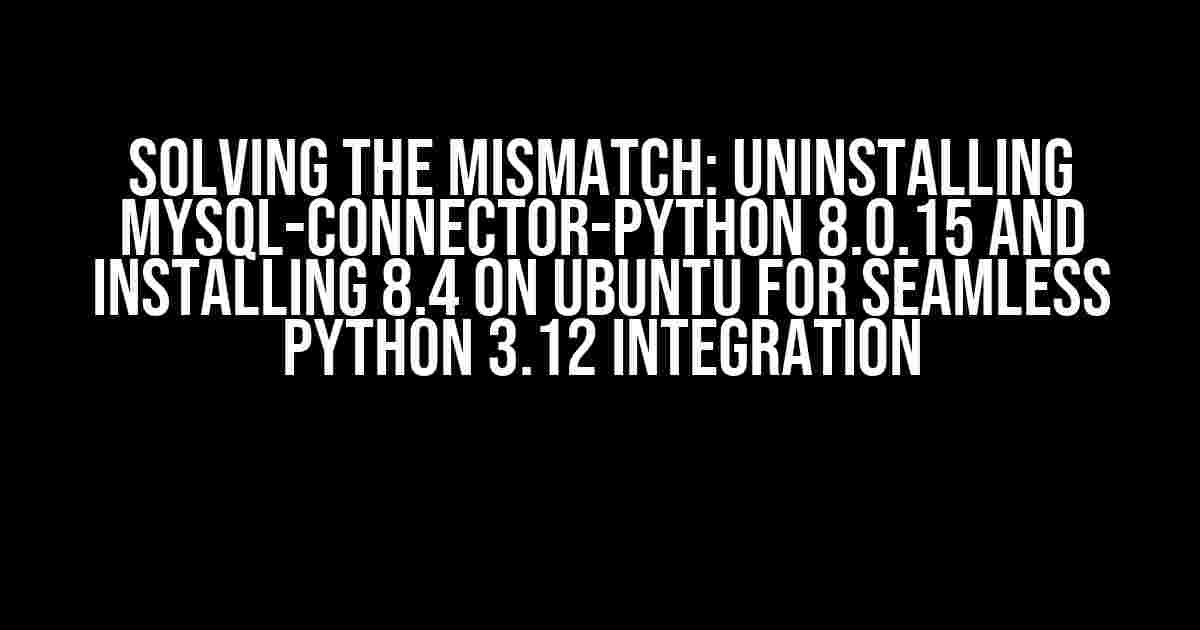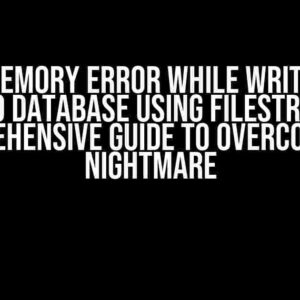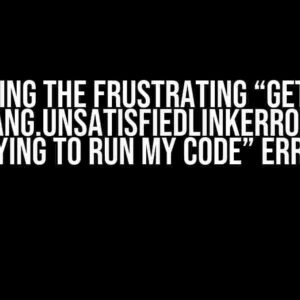Are you tired of dealing with the frustrating mismatch between Python 3.12 and mysql-connector-python 8.0.15? Do you want to upgrade to the latest version, 8.4, and ensure smooth sailing with your Python applications on Ubuntu? Look no further! In this comprehensive guide, we’ll walk you through the step-by-step process of uninstalling the outdated connector and installing the latest version, so you can focus on writing amazing code.
- The Problem: Incompatibility Between Python 3.12 and mysql-connector-python 8.0.15
- Uninstalling mysql-connector-python 8.0.15 on Ubuntu
- Installing mysql-connector-python 8.4 on Ubuntu
- Verifying Python 3.12 and mysql-connector-python 8.4 Integration
- Troubleshooting Common Issues
- Conclusion
- Additional Resources
The Problem: Incompatibility Between Python 3.12 and mysql-connector-python 8.0.15
The mysql-connector-python 8.0.15 version is not compatible with Python 3.12, leading to errors and inconsistent behavior in your applications. This incompatibility arises due to the differences in the internal workings of the two versions, making it essential to upgrade to a version that is compatible with Python 3.12.
Why Upgrade to mysql-connector-python 8.4?
mysql-connector-python 8.4 is the latest version, offering numerous benefits and improvements over its predecessors:
- Enhanced performance and stability
- Better support for Python 3.12 and newer versions
- Improved compatibility with various MySQL versions
- New features and bug fixes
Uninstalling mysql-connector-python 8.0.15 on Ubuntu
Before installing the new version, you need to remove the outdated connector. Follow these steps:
pip3 uninstall mysql-connector-python: This command will uninstall the mysql-connector-python package. You might be prompted to confirm the uninstallation.pip3 freeze | grep mysql-connector-python: This command will check if any residual packages are still present. If you see any packages listed, remove them using thepip3 uninstallcommand.sudo apt-get purge mysql-connector-python: This command will remove any system-level installations of the connector.
After completing these steps, make sure to restart your terminal or command prompt to ensure the changes take effect.
Installing mysql-connector-python 8.4 on Ubuntu
Now that the outdated connector is removed, let’s install the latest version:
pip3 install mysql-connector-python==8.4.0: This command will install the exact version 8.4.0 of mysql-connector-python. You can adjust the version number according to your needs.pip3 install --upgrade mysql-connector-python: If you want to install the latest available version, use this command instead.
After installation, verify that the correct version is installed using:
pip3 show mysql-connector-python
This command will display information about the installed package, including the version number.
Verifying Python 3.12 and mysql-connector-python 8.4 Integration
Now that you’ve installed the new connector, let’s test the integration with Python 3.12:
python3 -c "import mysql.connector"
If the import statement is successful, you should not see any errors. This indicates that the mysql-connector-python 8.4 is correctly installed and compatible with Python 3.12.
Troubleshooting Common Issues
If you encounter any problems during the uninstallation or installation process, refer to the following troubleshooting tips:
Error: Unable to Uninstall mysql-connector-python
If you’re unable to uninstall the package, try:
pip3 uninstall --force mysql-connector-python
This command will forcefully remove the package.
Error: Unable to Install mysql-connector-python 8.4
If you encounter issues during installation, try:
pip3 install --no-cache-dir mysql-connector-python==8.4.0
This command will install the package without using the cache, which might resolve any corruption issues.
Conclusion
In this article, we’ve guided you through the process of uninstalling mysql-connector-python 8.0.15 and installing the latest version, 8.4, on Ubuntu. By following these steps, you should now have a seamless integration between Python 3.12 and mysql-connector-python 8.4, enabling you to focus on developing amazing applications.
Additional Resources
For further guidance or troubleshooting, refer to the following resources:
- MySQL Connector/Python Documentation: https://dev.mysql.com/doc/connector-python/en/
- Python 3.12 Documentation: https://docs.python.org/3/
- Ubuntu Package Management: https://help.ubuntu.com/lts/serverguide/package-management.html
By following this comprehensive guide, you should be able to resolve the mismatch between Python 3.12 and mysql-connector-python 8.0.15, and enjoy a hassle-free development experience with the latest versions.
| Before | After |
|---|---|
| Incompatible mysql-connector-python 8.0.15 | Compatible mysql-connector-python 8.4 |
| Error-prone applications | Seamless Python 3.12 integration |
Frequently Asked Question
Get rid of the mismatch between Python 3.12 and mysql-connector-python 8.0.15, and level up your Ubuntu experience with these troubleshooting tips!
What’s the deal with the mismatch between Python 3.12 and mysql-connector-python 8.0.15?
The mismatch occurs because mysql-connector-python 8.0.15 is not compatible with Python 3.12. To resolve this, you need to uninstall the current version and install a compatible one, like mysql-connector-python 8.4.
How do I uninstall mysql-connector-python 8.0.15 on Ubuntu?
Easy peasy! Run the following command in your terminal: `pip3 uninstall mysql-connector-python`. This will remove the current version of the connector.
How do I install mysql-connector-python 8.4 on Ubuntu?
Simple! Run the following command in your terminal: `pip3 install mysql-connector-python==8.0.24` (or any other compatible version). This will install the desired version of the connector.
Will uninstalling mysql-connector-python 8.0.15 affect my existing projects?
Uninstalling the connector won’t affect your existing projects, but it’s always a good idea to take a backup of your project files and database before making any changes. Once you’ve installed the new version, you might need to update your project dependencies and import statements.
What if I encounter issues after installing mysql-connector-python 8.4?
If you encounter issues, try reinstalling the connector or checking your project dependencies. You can also refer to the official documentation or seek help from online communities, like Stack Overflow or GitHub.



